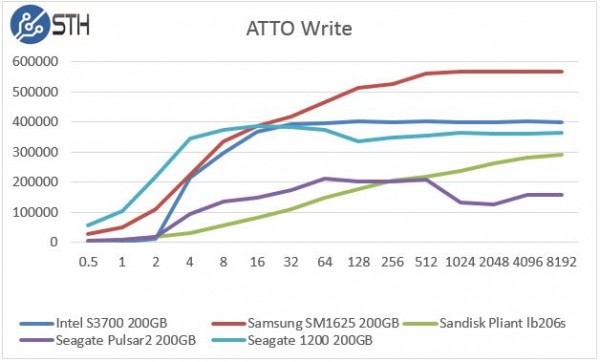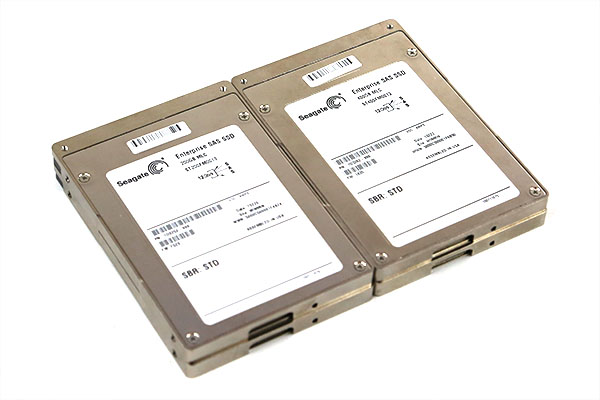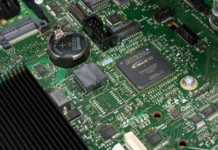Today we are putting the Seagate 1200 200GB SAS SSD through our quick benchmarks. The actual model name is the Seagate ST200FM0013 for these drives, but they are from the 1200 series. Over the past few months we have been building a data set around datacenter SAS SSDs. We have been finding some interesting differences in performance thus far and we are going to have an interesting finding today. The Seagate 1200 series of SAS SSDs are 12gbps capable drives that were a major update to the Pulsar.2 line which we previously benchmarked.
Test Configuration
Since we are going to assume the use of already released hardware, we are using a legacy system for testing across the test suite given that we started the process before the Haswell-EP parts became available.
- Motherboard: Gigabyte GA-7PESH3
- Processors: Dual Intel Xeon E5-2690 (V2)
- SAS Controller: LSI SAS 3008
- RAM: 64GB DDR3L-1600MHz ECC RDIMMs
- OS SSD: Kingston V300 240GB
We are using a SAS controller so one cannot compare results directly to consumer-driven setups where a SATA SSD is connected to an Intel PCH port. There is a latency penalty for going over the PCIe bus to a controller to SAS. It also is a reason NVMe is going to be a game changer in the enterprise storage space.
One major note: we have been testing drives using a single-port configuration. That has little impact on some drives (e.g. the Toshiba PX02SMF series) but has significant impacts on some drives like the Seagate 1200 as we will see.
Seagate 1200 200GB SSD Quick Benchmarks
For our quick tests during this part of the series we will just provide the quick benchmarks with only a bit of commentary. The results should be fairly straightforward and the index of previous articles in this series (linked above) is a good resource to compare against. We are also adding the results for a few other 200GB SAS offerings we have used and an Intel S3700 200GB drive.
AS SSD Benchmark
AS SSD is a solid benchmark that does not write compressible data to drives. The result is perhaps one of the best workstation SSD benchmarks available today.

The Seagate ST200FM0013 here shows speeds that look more like SAS2 speeds than the Seagate Pulsar.2 we tested but falls well below what we would expect to see from a SAS3 drive. We did verify the link to the controller was at 12gbps. We made a few calls after the results and found out that peak performance occurs with multipath I/O via a dual ported connection to the drive.
CrystalDiskMark
CrystalDiskMark is another benchmark which gives non-compressible read/write numbers. This is in contrast to the ATTO Benchmark used by LSI/ Sandforce and its partners when they market a given solid state drive.

Here we see that the Seagate 1200 200GB drive performs well at the higher queue depth Write 4K QD32 test. In virtually every test it outperforms both the Seagate Pulsar.2 200GB as well as the SanDisk Lightning lb206s 200GB SLC drive.
ATTO Benchmark
The value of the ATTO benchmark is really to show the best-case scenario. ATTO is known to write highly compressible data to drives, which inflates speeds of controllers that compress data like LSI/ SandForce does prior to writing on a given solid state drive.

In terms of write performance v. transfer size we can see the Seagate 1200 200GB drive performance fairly well. In the larger size sequential tests the Samsung SM1625 200GB SAS2 drive is extremely strong in. On the other hand the Seagate dombinates other drives up to the 8k transfers. We can see that compared to the previous generation drive, Seagate had a massive generational performance improvement.

On the read side, we again see the Seagate perform well. It actually leads all drives up until the 16k transfer size which is when the Samsung drive again pulls ahead. Certainly this is a very nice result for the Seagate 1200 200GB drive.
Conclusion
Overall, we were extremely pleased with the performance of the Seagate 1200 200GB drive. Each drive we test has different strengths and weaknesses. It seems that the Seagate drive excels in small file size sequential transfers and high queue depth small file size transfers.




